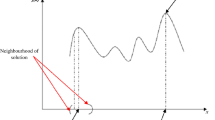Abstract
Present chapter embodies an introductory overview of optimization and metaheuristic algorithms. An optimization problem consists of maximizing or minimizing a real function by systematically choosing input values from within an allowed set and computing the value of the function. The generalization of optimization theory and techniques to other formulations constitutes a large area of Applied Mathematics. More generally, optimization consists of finding best available values of some objective function given a defined domain including a variety of different types of objective functions and different types of domains. One of the most significant trends in the field of optimization is the continually increasing emphasis on the interdisciplinary nature. Optimization has been a basic tool in all areas of Applied Mathematics, Engineering, Economics, Medical Science and other field of Sciences. The latest developments over the last few decades tend to use metaheuristic algorithms. In fact, a vast majority of modern optimization techniques includes metaheuristic algorithms. Metaheuristic algorithms such as Particle Swarm Optimization, Ant Colony Optimization, Artificial Bee Colony, Genetic Algorithm, Simulated Annealing, Cuckoo Search, Differential Evaluation, Biography Based Optimization and Harmony Search etc. are becoming very powerful in solving hard optimization problems and they have been applied in almost all major areas of science and engineering as well as industrial applications. In this chapter a general overview from the era of Fermat and Lagrange who introduced calculus based formulae to identify optima is given. Also, foundation of optimization provides a brief introduction to the underlying nature of optimization and the common approaches to optimization problems, random number generation, the Monte Carlo method, and the Markov chain Monte Carlo method. This chapter introduces all the major metaheuristic algorithms and a wide range of applications that use metaheuristic algorithms to solve challenging optimization problems while also introducing various modifications used for multi-objective optimization. Throughout this chapter, the author presents worked out examples and real world applications that illustrate the modern relevance of the topic. In addition, references to the current literature enable readers to investigate individual algorithms and methods in greater detail.
Access this chapter
Tax calculation will be finalised at checkout
Purchases are for personal use only
Similar content being viewed by others
References
H.A. Eschenauer, G. Thierauf, Discretization Methods and Structural Optimization—Procedures and Applications (Springer, Berlin, 1989)
S. Smriti et al., Special issue on intelligent tools and techniques for signals, machines and automation. J. Intell. Fuzzy Syst. 35(5), 4895–4899 (2018). https://doi.org/10.3233/JIFS-169773
History of Mathematics and Mathematicians. http://turnbull.dcs.st-and.ac.uk/history/Mathematicians
History of Optimization. http://hse-econ.fi/kitti/opthist.html
X.S. Yang, Mathematical Foundations (Wiley, New York, 2018)
S. Dreyfus, Richard Bellman on the birth of dynamic programming. Oper. Res. 50(1), 48–51 (2002)
X. Yang, Engineering Optimization: An Introduction with Metaheuristic Applications (Wiley, New York, 2010)
R. Dorfman, The discovery of linear programming. Ann. Hist. Comput. 6(3), 283–295 (1984)
S. Das, A. Abraham, A. Konar, Metaheuristic Clustering (Springer, New York, USA, 2009)
A. Khatri et al., Optimal design of power transformer using genetic algorithm, in Proceedings of IEEE International Conference on Communication System’s Network Technologies (2012), pp. 830–833. https://doi.org/10.1109/csnt.2012.180
T. Mahto et al., Load frequency control of a solar-diesel based isolated hybrid power system by fractional order control using particle swarm optimization. J. Intell. Fuzzy Syst. 35(5), 5055–5061 (2018). https://doi.org/10.3233/JIFS-169789
H. Malik et al., PSO-NN-based hybrid model for long-term wind speed prediction: a study on 67 cities of India, in Applications of Artificial intelligence Techniques in Engineering, Advances in Intelligent Systems and Computing, vol. 697 (2018), pp. 319–327. https://doi.org/10.1007/978-981-13-1822-1_29
T. Mahto et al., Fractional order control and simulation of wind-biomass isolated hybrid power system using particle swarm optimization, in Applications of Artificial intelligence Techniques in Engineering, Advances in intelligent Systems and Computing, vol. 698 (2018), pp. 277–287. https://doi.org/10.1007/978-981-13-1819-1_28
W. Sun, Y.X. Yuan, Optimization Theory and Methods (Springer, Science and Business Media LLC, 2006)
H.H. Sohrab, Basic Real Analysis (Springer Science & Business Media, 2011); D.B. Bridges, Computability (Springer, New York, 1994)
S.K. Mishra, S. Wang, K.K. Lai, V-Invex Functions and Vector Optimization (Springer, New York, USA, 2008)
X.S. Yang, Introduction to Computational Mathematics (World Scientific, 2008)
S.P. Boyd, L. Vandenberghe, Convex Optimization (Cambridge University Press, 2004)
Acknowledgements
We (Dr. Padam Singh and Dr. Sushil Kumar Choudhary) would like to thank management of Galgotias College of Engineering and Technology, Greater Noida and Mahamaya College of Agricultural Engineering and Technology, Ambedkar Nagar for all cooperation and contribution. We are also thankfull to reviewers, editorial board, publication and marketing team for their valuable suggestions and for further improvement of quality and standard of the present work.
Author information
Authors and Affiliations
Corresponding author
Editor information
Editors and Affiliations
Rights and permissions
Copyright information
© 2021 The Editor(s) (if applicable) and The Author(s), under exclusive license to Springer Nature Singapore Pte Ltd.
About this chapter
Cite this chapter
Singh, P., Choudhary, S.K. (2021). Introduction: Optimization and Metaheuristics Algorithms. In: Malik, H., Iqbal, A., Joshi, P., Agrawal, S., Bakhsh, F.I. (eds) Metaheuristic and Evolutionary Computation: Algorithms and Applications. Studies in Computational Intelligence, vol 916. Springer, Singapore. https://doi.org/10.1007/978-981-15-7571-6_1
Download citation
DOI: https://doi.org/10.1007/978-981-15-7571-6_1
Published:
Publisher Name: Springer, Singapore
Print ISBN: 978-981-15-7570-9
Online ISBN: 978-981-15-7571-6
eBook Packages: Intelligent Technologies and RoboticsIntelligent Technologies and Robotics (R0)




